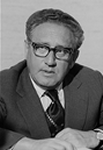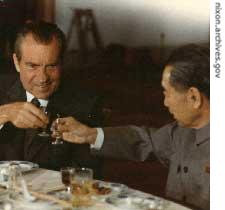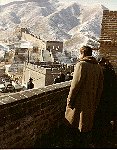VOA慢速英语 2007 0517b
时间:2019-01-11 作者:英语课 分类:VOA慢速英语2007年(五)月
VOICE ONE:
This is Rich Kleinfeldt.
VOICE TWO:
And this is Doug Johnson with THE MAKING OF A NATION -- a VOA Special English program about the history of the United States.
(MUSIC)
Today, we continue the story of the thirty-seventh president of the United States, Richard Nixon.
(MUSIC)
VOICE ONE:
It is nineteen sixty-nine in America. Richard Nixon is in the first year of his first term in office. His biggest foreign policy problem is the continuing war in Vietnam.
During the election campaign, he had promised to do something to end the war. Some Americans believe the United States should withdraw from Vietnam immediately. Bring the soldiers back home, they say.
Others believe the United States should take whatever measures are necessary to win. Expand the ground war, they say, or use nuclear weapons.
VOICE TWO
The decision is not easy. Withdrawing allied 1 troops would leave South Vietnam alone to fight against communist North Vietnam. And that was the reason the United States became involved in the conflict. It wanted to prevent the Communists from taking over the South. Expanding the military effort would mean more deaths.
Already, by nineteen sixty-nine, more Americans had died in Vietnam than in the Korean War.
VOICE ONE
For Richard Nixon, the war is a terrible test. If he is not able to deal with it, his presidency 2 could end like Lyndon Johnson's ended. Johnson decided 3 not to run for re-election after he lost public and political support for his war policies.

Henry Kissinger
How did the new president deal with the problem? Like Johnson, he made decisions based on information from his advisers 5. His most important adviser 4 was Henry Kissinger. Kissinger was an expert on foreign relations. He later served as Nixon's secretary of state.
Together, they tried many ways to settle the conflict in Vietnam. It took several years to end American involvement there.
VOICE TWO:
The American efforts were both diplomatic and military. The Nixon administration started new, secret peace talks in Paris. The official peace talks were taking place in Paris at the same time. The administration withdrew some troops from Vietnam.
Yet it sent other troops into Cambodia secretly. And it began dropping bombs on Laos. It also started dropping bombs on North Vietnam again. Former president Johnson had stopped the bomb attacks a few years earlier.
(MUSIC)
VOICE ONE
Efforts to end American involvement did not begin suddenly. For his first eight months in office, President Nixon made no major policy changes. Then, in October nineteen sixty-nine, he ordered the withdrawal 6 of sixty thousand troops.
He said he acted to speed the peace talks. He also ordered American commanders to give the South Vietnamese most of the responsibility for fighting.
VOICE TWO:
Americans were happy that fewer troops would be involved. But many were unhappy that the withdrawal was not complete. Huge anti-war demonstrations 7 took place in the United States in the autumn of nineteen sixty-nine. On November fifteenth, several hundred thousand people protested in Washington, D.C.

1970: President Nixon announces the Cambodian invasion in a speech to the American people
President Nixon tried to explain his policy to anti-war protesters. A slow withdrawal of troops is not the easy way, he told them, but it is the right way. He also continued his efforts for a military victory.
VOICE ONE:
In the spring of nineteen seventy, American and South Vietnamese troops invaded Cambodia. They attacked Communist supply centers there. Early the following year, the Nixon administration decided to provide air and artillery 8 support for a South Vietnamese invasion of Laos. The goal was to stop supplies from reaching North Vietnam through that country.
The military action in Laos lasted forty-four days. South Vietnamese forces destroyed many enemy weapons. However, they also suffered many deaths and injuries. And many American planes were shot down. After six weeks, the South Vietnamese were forced to withdraw.
VOICE TWO:
Many members of the United States Congress were angry. They said the invasion of Laos was another in a long series of failures. The Nixon administration had said that the United States was winning the war. Opposition 9 lawmakers said the administration was lying. Criticism by the American public grew louder, too.
President Nixon answered by saying again that the United States must not permit North Vietnam to take over South Vietnam. Former president Johnson had said the same thing. For a long time, many Americans accepted it. As the war continued, however, public opinion changed.
In nineteen sixty-five, sixty-one percent of those questioned approved the war. By nineteen seventy-one, sixty-one percent did not approve.
(MUSIC)
VOICE ONE:
The official peace talks in Paris offered little hope of settlement. Over a period of several years, each side made proposals. Then each side rejected the proposals. One American observer said: "As long as either side thinks it can win a military victory, there is no hope for official peace talks."
President Nixon wanted to ease public tension and anger over the war. So he announced that Henry Kissinger had held twelve secret meetings with North Vietnamese officials. But the secret meetings made no more progress than the official talks.
VOICE TWO:
In late March nineteen seventy-two, North Vietnam launched a major offensive. In May, Nixon ordered increased bomb attacks against roads and railways in the North. By the end of August, the communist offensive had been stopped. Yet many lives had been lost. The pressure to withdraw American forces grew stronger.
For the next five months, the Nixon administration continued a policy of official talks, secret meetings, and increased military action. Finally, the president announced that an agreement had been reached at the peace talks in Paris. There would be a ceasefire. And negotiators from the United States, South Vietnam, North Vietnam, and the Viet Cong would sign the official agreement.
VOICE ONE:
Under the terms of the agreement, all American and allied forces would withdraw from South Vietnam. The North and South would be free to settle their conflict without interference from other countries. President Nixon made the official announcement from the White House.
RICHARD NIXON: "At twelve-thirty Paris time today, January twenty-three, nineteen seventy-three, the agreement on ending the war and restoring peace in Vietnam was initialed by Doctor Henry Kissinger on behalf of the United States and special adviser Le Duc Tho on behalf of the Democratic Republic of Vietnam. The agreement will be formally signed by the parties participating in the Paris conference on Vietnam on January twenty seven, nineteen-seventy-three, at the international conference center in Paris. ...
"The United States and the Democratic Republic of Vietnam express the hope that this agreement will insure stable peace in Vietnam and contribute to the preservation 10 of lasting 11 peace in Indochina and Southeast Asia."
(MUSIC)
VOICE TWO:
Another foreign policy problem during the Nixon administration was China. The president had much greater success dealing 12 with this problem than with Vietnam. Communists took power in China in nineteen forty-nine. However, the United States did not recognize the Communist government. Instead, it recognized the Nationalist government in Taiwan.
In the early nineteen seventies, the Nixon administration began trying to improve relations. It eased restrictions 13 on travel to China. And it supported a visit to China by the United States table tennis team. Then, President Nixon made a surprise announcement. He, too, would visit China.

With Chou En-lai in 1972
VOICE ONE:
The historic event took place in February, nineteen seventy-two. Chinese leaders Mao Zedong and Zhou En-lai greeted the American president. Nixon and Zhou held talks that opened new possibilities for trade. The next year, Nixon sent a representative to open a diplomatic office in Beijing. After more than twenty years, the two countries were communicating again. They established official relations in nineteen seventy-nine.
VOICE TWO:
Many Americans expressed pleasure that tensions between the two countries had decreased. Many were proud to see their president standing 14 on the Great Wall of China.

And at Great Wall
History experts would later agree that it was the greatest moment in the presidency of Richard Nixon.
(MUSIC)
VOICE ONE:
This program of THE MAKING OF A NATION was written by Jeri Watson and produced by Paul Thompson. This is Rich Kleinfeldt.
VOICE ONE:
And this is Doug Johnson. Join us again next week for another VOA Special English program about the history of the United States
- Britain was allied with the United States many times in history.历史上英国曾多次与美国结盟。
- Allied forces sustained heavy losses in the first few weeks of the campaign.同盟国在最初几周内遭受了巨大的损失。
- Roosevelt was elected four times to the presidency of the United States.罗斯福连续当选四届美国总统。
- Two candidates are emerging as contestants for the presidency.两位候选人最终成为总统职位竞争者。
- This gave them a decided advantage over their opponents.这使他们比对手具有明显的优势。
- There is a decided difference between British and Chinese way of greeting.英国人和中国人打招呼的方式有很明显的区别。
- They employed me as an adviser.他们聘请我当顾问。
- Our department has engaged a foreign teacher as phonetic adviser.我们系已经聘请了一位外籍老师作为语音顾问。
- a member of the President's favoured circle of advisers 总统宠爱的顾问班子中的一员
- She withdrew to confer with her advisers before announcing a decision. 她先去请教顾问然后再宣布决定。
- The police were forced to make a tactical withdrawal.警方被迫进行战术撤退。
- They insisted upon a withdrawal of the statement and a public apology.他们坚持要收回那些话并公开道歉。
- Lectures will be interspersed with practical demonstrations. 讲课中将不时插入实际示范。
- The new military government has banned strikes and demonstrations. 新的军人政府禁止罢工和示威活动。
- This is a heavy artillery piece.这是一门重炮。
- The artillery has more firepower than the infantry.炮兵火力比步兵大。
- The party leader is facing opposition in his own backyard.该党领袖在自己的党內遇到了反对。
- The police tried to break down the prisoner's opposition.警察设法制住了那个囚犯的反抗。
- The police are responsible for the preservation of law and order.警察负责维持法律与秩序。
- The picture is in an excellent state of preservation.这幅画保存得极为完好。
- The lasting war debased the value of the dollar.持久的战争使美元贬值。
- We hope for a lasting settlement of all these troubles.我们希望这些纠纷能获得永久的解决。
- This store has an excellent reputation for fair dealing.该商店因买卖公道而享有极高的声誉。
- His fair dealing earned our confidence.他的诚实的行为获得我们的信任。
- I found the restrictions irksome. 我对那些限制感到很烦。
- a snaggle of restrictions 杂乱无章的种种限制